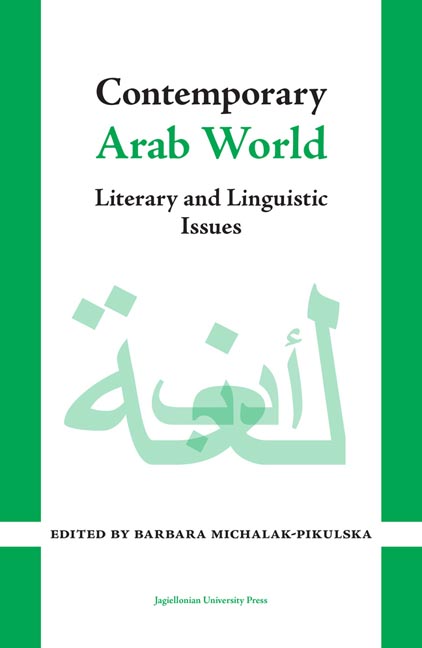Book contents
- Frontmatter
- Contents
- Introduction
- Between past achievements and future challenges Arabic language teaching at the university level – example of the Department of Arabic Studies at the Jagiellonian University in Cracow
- Meanings and functions of genitive constructions in Modern Standard Arabic
- Sultan Qaboos – image of the ruler in panegyrics and elegies by Omani poets
- Microfiction, flash fiction or very short story in modern Arabic literature
- In the maze of discourses – monodrama Bāy bāy Ğīllū (Bye Bye Gillo) by Ṭaha ‘Adnān
- Women in Islamic State propaganda
- Annex
Introduction
Published online by Cambridge University Press: 14 October 2023
- Frontmatter
- Contents
- Introduction
- Between past achievements and future challenges Arabic language teaching at the university level – example of the Department of Arabic Studies at the Jagiellonian University in Cracow
- Meanings and functions of genitive constructions in Modern Standard Arabic
- Sultan Qaboos – image of the ruler in panegyrics and elegies by Omani poets
- Microfiction, flash fiction or very short story in modern Arabic literature
- In the maze of discourses – monodrama Bāy bāy Ğīllū (Bye Bye Gillo) by Ṭaha ‘Adnān
- Women in Islamic State propaganda
- Annex
Summary
Publication entitled The Contemporary Arab World. Literary and Linguistic Issues was designed and written by the members of staff of the Department of Arabic Studies of the Jagiellonian University in Kraków. It shows results of the research linked to their scholarly and didactic interests. It is a collection of six papers dealing with selected issues in the field of Arabic language and literature, focused on phenomena and processes taking place in contemporary Arab world.
Teaching Arabic as a foreign language faces many methodological challenges connected with the specificity and complexity of the sociolinguistic situation in the Arab world. They mostly concern the necessity for considering different types (registers) of the language, distinguishing, understanding and using which makes it possible for learners to achieve full communication skills.
The end of the 20th and the beginning of the 21st century brought above all a new look at the didactic process, forcing revision of the traditional grammar – translation method in teaching foreign languages. Higher education schools must cope with new problems connected with their functioning on the broad market of formal and informal education, which is determined by the term “success on the job market”. Needs and expectations of learners change. Which direction will development of Arabic Studies take then? How to bring together the mission of higher education institutions and pragmatic needs of the market, or current needs of “consumers” and guidelines of central curricula. Is such compromise possible?
The main area of reflection in the chapter Between past achievements and future challenges by Agnieszka Pałka-Lasek is going to be the issues connected with university didactics on the example of the Jagiellonian University in Krakow and its Department of Arabic Studies.
In the chapter Meanings and functions of genitive constructions in Modern Standard Arabic Iwona Król discusses genitive constructions containing substantives as well as adjectives and numerals as nomen regens and substantives as nomen rectum. In all these groups of genitival phrases their determined components precede determiners, and irrespective of part of speech they represent, they follow syntactic rules of a substantive. The grammatical properties of nomen rectum are determined by the meaning of the whole phrase or by syntactic demands within the sentence. The paper is aimed at determining general meanings of particular constructions of the same formal type. Numerous examples gathered here may be useful for university teaching.
- Type
- Chapter
- Information
- Contemporary Arab WorldLiterary and Linguistic Issues, pp. 7 - 10Publisher: Jagiellonian University PressPrint publication year: 2020

